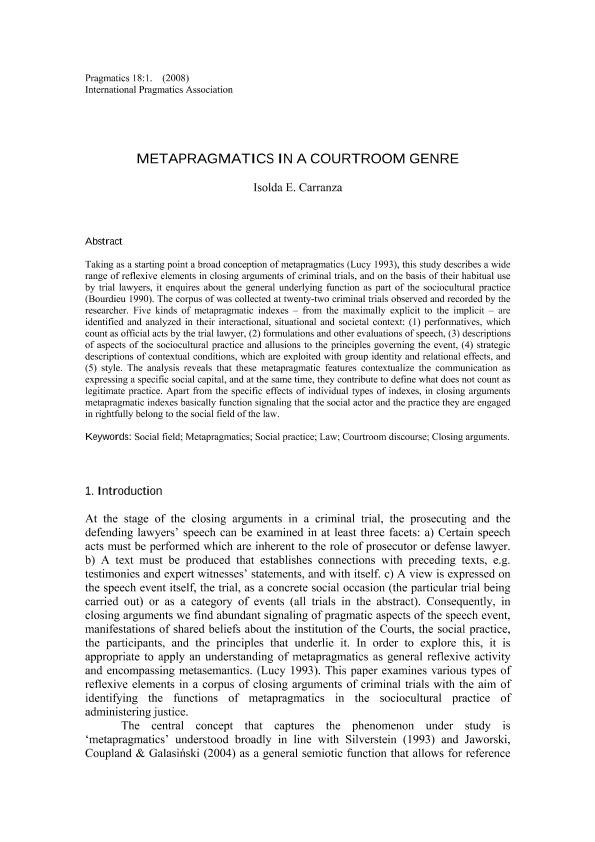Mostrar el registro sencillo del ítem
dc.contributor.author
Carranza, Isolda Esmeralda

dc.date.available
2021-03-03T11:46:51Z
dc.date.issued
2008-12
dc.identifier.citation
Carranza, Isolda Esmeralda; Metapragmatics in a courtroom genre; International Pragmatics Association; Pragmatics (wilrijk); 18; 2; 12-2008; 169-188
dc.identifier.issn
1018-2101
dc.identifier.uri
http://hdl.handle.net/11336/127222
dc.description.abstract
Taking as a starting point a broad conception of metapragmatics (Lucy 1993), this study describes a wide range of reflexive elements in closing arguments of criminal trials, and on the basis of their habitual use by trial lawyers, it enquires about the general underlying function as part of the sociocultural practice (Bourdieu 1990). The corpus of was collected at twenty-two criminal trials observed and recorded by the researcher. Five kinds of metapragmatic indexes – from the maximally explicit to the implicit – are identified and analyzed in their interactional, situational and societal context: (1) performatives, which count as official acts by the trial lawyer, (2) formulations and other evaluations of speech, (3) descriptions of aspects of the sociocultural practice and allusions to the principles governing the event, (4) strategic descriptions of contextual conditions, which are exploited with group identity and relational effects, and (5) style. The analysis reveals that these metapragmatic features contextualize the communication as expressing a specific social capital, and at the same time, they contribute to define what does not count as legitimate practice. Apart from the specific effects of individual types of indexes, in closing arguments metapragmatic indexes basically function signaling that the social actor and the practice they are engaged in rightfully belong to the social field of the law.
dc.format
application/pdf
dc.language.iso
eng
dc.publisher
International Pragmatics Association
dc.rights
info:eu-repo/semantics/openAccess
dc.rights.uri
https://creativecommons.org/licenses/by-nc-sa/2.5/ar/
dc.subject
SOCIAL FIELD
dc.subject
METAPRAGMATICS
dc.subject
SOCIAL PRACTICE
dc.subject
LAW
dc.subject
COURTOOM DISCURSE
dc.subject
CLOSING ARGUMENTS
dc.subject.classification
Estudios Generales del Lenguaje

dc.subject.classification
Lengua y Literatura

dc.subject.classification
HUMANIDADES

dc.title
Metapragmatics in a courtroom genre
dc.type
info:eu-repo/semantics/article
dc.type
info:ar-repo/semantics/artículo
dc.type
info:eu-repo/semantics/publishedVersion
dc.date.updated
2021-01-18T15:48:56Z
dc.journal.volume
18
dc.journal.number
2
dc.journal.pagination
169-188
dc.journal.pais
Bélgica

dc.journal.ciudad
Amberes
dc.description.fil
Fil: Carranza, Isolda Esmeralda. Consejo Nacional de Investigaciones Científicas y Técnicas. Centro Científico Tecnológico Conicet - Córdoba. Centro de Investigaciones y Estudios sobre Cultura y Sociedad. Universidad Nacional de Córdoba. Centro de Investigaciones y Estudios sobre Cultura y Sociedad; Argentina
dc.journal.title
Pragmatics (wilrijk)

dc.relation.alternativeid
info:eu-repo/semantics/altIdentifier/url/https://journals.linguisticsociety.org/elanguage/pragmatics/article/view/539.html
Archivos asociados
